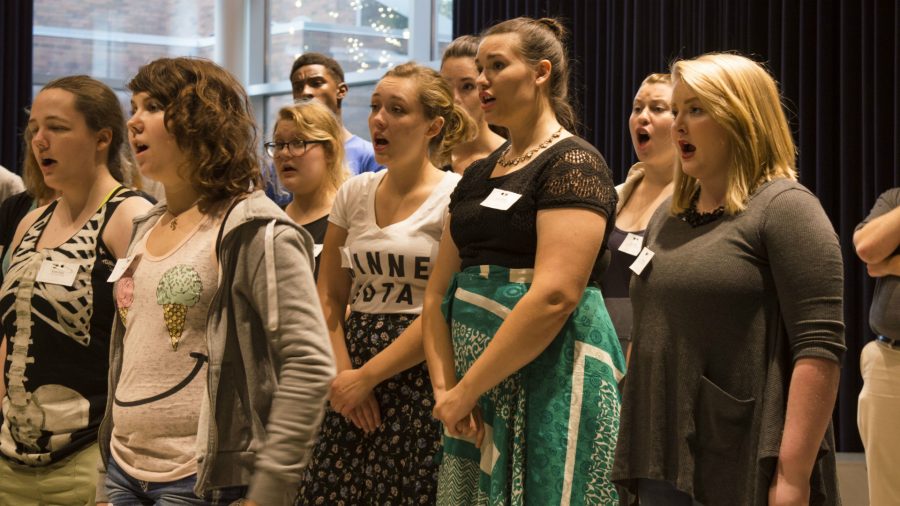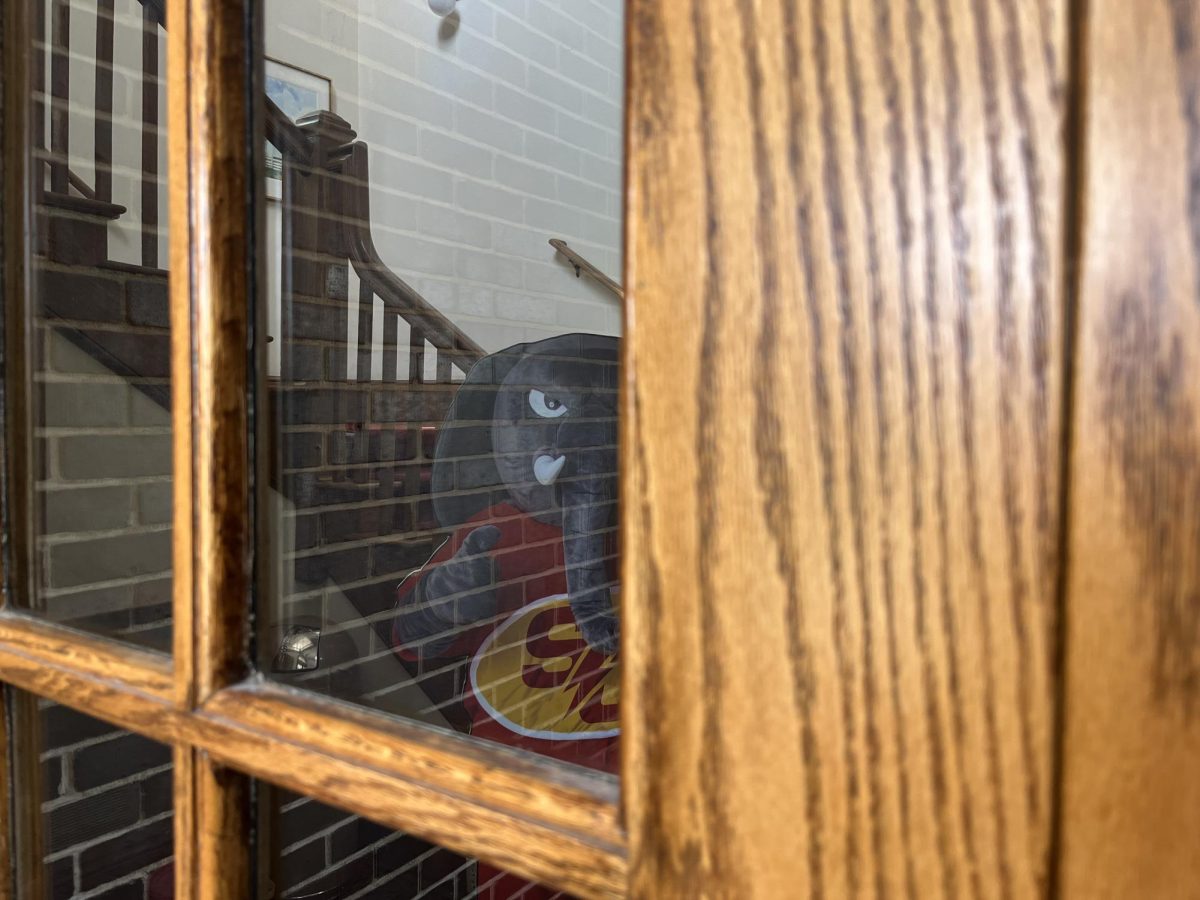New York guest director modernizes upcoming double-billed opera
October 5, 2016
INDIANOLA, Iowa — The room turns silent as students rush off of the stage and into a stairwell. A keyboard begins to play, and as their cue appears in the form of a tune, students reappear and begin placing themselves across the stage. They are immersed in their characters as one person steps forward and begins to sing.
Everything stops. The director starts calling out directions, moving people to different spots on the stage, having certain people kneel while others stand and answering questions. After a few moments, they begin their performance again.
This is what happens behind the scenes as Simpson College students prepare to perform the fall semester opera, a double-bill performance of “Venus and Adonis” by John Blow and “Dido and Aeneas” by Henry Purcell.
After weeks of preparation, the opera will take place this weekend in Pote Theatre in the Blank Performing Arts Center. Performance times are at 7:30 p.m. Friday and Saturday, and at 2 p.m. Sunday.
Simpson’s music department website said music direction would be by Bernard McDonald, stage direction by guest director Crystal Manich, scenic design by Lindsay Coda and lighting design by Rick Goetz.
The production process for the opera started long before students returned to Simpson’s campus for the fall semester. McDonald, assistant professor of music at Simpson, said the process started by selecting the pieces and the guest director.
McDonald explained the scripts are chosen based on both incoming and returning students. He said the selection process is a significant research project, and the final script choice is intended to offer a deep immersion in preprofessional opera production to students.
Also, each year during one of the two opera performances, Simpson invites a guest director from the field. This year, Manich, who holds a bachelor of fine arts in drama directing from Carnegie Mellon University School of Drama and works within opera in New York, was asked to direct.
“One of the things Crystal brings is the ability to teach our students about singing and acting, about movement, and also to teach what it is like to work as a professional in this field,” McDonald said. “Not all of (the students) will become opera professionals, but many of them will become music educators, some will become choir directors, some will direct high school musical. You learn all of these things by taking part in the Simpson opera program.”
“Venus and Adonis” and “Dido and Aeneas” are being performed as a double-bill, which is when two, different short-length operas are combined and performed together in separate acts.
These scripts were chosen to be performed together due to their similarities.
“We are treating the two pieces as one piece because they do have a lot of linking themes: a strong woman who falls for a strong man, a boar that I think represents fate and death, and there is also a theme of the men being called to duty of some kind,” Manich said.
Manich also said she chose to modernize the pieces so they would take place during World War II — an era the audience would recognize.
After these are selected, McDonald said, the next step is casting the show. The opera was cast during the summer, with many solo roles assigned to returning students.
Michael Ciesielski, who is studying music and theater, is a Simpson freshman who was cast into a role in both acts of the opera production.
Ciesielski said he heard about the opera while talking with other students. He did not originally plan to audition. However, he was encouraged by his voice teacher, Bruce Brown, to participate in the cattle call.
Ciesielski said he had never performed in an opera before, which is causing him a bit uncertainty.
“The music is very intense, and the diction is a lot different from the singing I am used to,” Ciesielski said.
He ultimately decided to audition using memorized musical theater pieces from the musical “Chess.” Soon after, he learned he was cast as Chorus in both acts of the opera production.
After casting, students begin to study and learn the material, and they attend chorus rehearsals. Then, the director is introduced and presents a full schedule of rehearsals leading up to the final performances. This process is highly organized and designed months before rehearsals begin.
Over the following weeks, new elements are slowly introduced including music, staging, props, costumes, lights and, toward the very end, the orchestra.
The Simpson opera will be using a period band, using instruments of the 17th century, McDonald said. This includes a harpsichord, a string quartet, two recorders and lutes.
“Using this kind of band is unusual in student productions,” McDonald said. “We are very fortunate that we have the means, the resources and the expertise to do that. Our students are getting a historically informed performance.”
McDonald said the students are involved throughout the process, and he is proud of the students for their participation.
“The biggest thrill of all is being able to share my love and enthusiasm of music and the art form with people who ordinarily would not have this experience. We get to give (the students) an artistic experience that, at its best, is life-changing,” McDonald said. “There is a great deal of student initiative and student leadership in the program. It is quite remarkable.”
One of these student leaders is Haley Stamats, a senior studying music and public relations. She has been working hard in preparation for the performance, though her role takes place behind the scenes rather than on the stage.
Stamats said she has been a part of the cast in past productions, but over the last two years, she has developed an interest and involvement in the production process. She approached McDonald about being involved in the production side and was offered the positions of stage manager and assistant director.
“I like to perform, but I find myself more satisfied in directing, and that is what I want to go into,” she said. “I enjoy being in the rehearsal room, working with the actors and seeing them perform, and basically creating and telling the story. That is the most exciting part.”
Through these roles, Stamats helps dictate where objects are placed on the stage, facilitates props and costumes, assists the director in taking notes and blocking, preparing the rehearsal space and facilitating everything that runs on stage such as set pieces moving, the curtains and lighting.
“I am always the first one there and the last one to leave,” Stamats said.
Stamats said her biggest challenge has been finding a balance between her role in the opera, academics, other obligations and setting time aside for herself.
“Beyond the production team, it’s kind of a thankless job. The audience doesn’t know what happens beyond the stage or what we do when we rehearse. No one really knows what happens the six weeks before a show is put on,” Stamats said.
As the countdown approaches zero, Ciesielski said he is both excited and nervous for the performance.
“This is my first opera ever, so I am a little worried I won’t do things right,” he said.
Manich said worrying is part of the process.
“You never think it is going to happen,” she said. “Professional or not, there is always a point where you are thinking, ‘This is never going to happen, and we are never going to make it to opening night,’ but we always do.”
Ciesielski said the moment where everything comes together and works is what he looks forward to most.
“My favorite moment of a show is at the end of the first run when things have clicked together, everything has worked out, and we all just take a sigh of relief,” he said.
Being involved in the opera, Stamats and Ciesielski said, is a major time commitment, but they also agree the experience is worth all the hard work.
“I highly encourage people to get involved in the fine arts, whether it be the opera or a play. It’s a unique experience, of working so hard for a three-night show, and nothing can replace that,” Ciesielski said.
Stamats encourages students to find time and see the opera during one of its performance times.
“People have worked really hard on it,” she said. “It’s OK if you come and you fall asleep. It’s beautiful music, and it soothes the soul. You realize how beautiful of an art form it is. It is an art form that has lasted for centuries.”
Tickets can be ordered online at www.simpsonmusic.tix.com or through the Music/Opera Ticket Office at 515-961-1637. Simpson students can reserve one ticket for themselves, and non-student tickets cost $18 each.
The spring 2017 production, according to the Simpson website, will be “Hansel and Gretel” by Engelbert Humperdinck.






